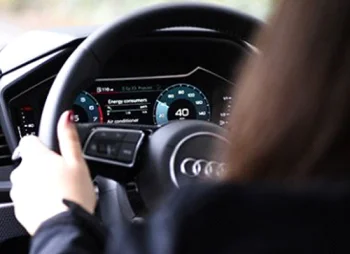Depreciation and car lease prices
It’s one of leasing’s USPs – you are only funding the depreciation of the vehicle rather than the full vehicle cost.
Financing a smaller sum means you’re paying less interest for the same product.
This is one of many ways that leasing differs from PCP and other car finance products, and it keeps monthly payments lower.
Depreciation describes the difference in value of your car at the point you take delivery compared to when you hand it back at the end of your lease. The car's value at the end of your lease is what we call its residual value.
Age, mileage and vehicle condition will all impact this, which is why you need to agree to these terms before you take on your lease contract.
What you pay for your car lease will be dependent on the difference between the car’s OTR as set by the manufacturer, and the residual value predicted by the funder.
They will therefore be immensely clever people and tools in charge of calculating residual values. And as the official owners and the ones who will need to sell the car on at the end of your term, it’s a critical element for funders to get right.
As with OTRs, funders can change their predicted residual values without notice and this affects advertised prices for browsing customers.
But it is important to note that whether the funder is accurate in their residual value prediction at the end of your lease or not, your monthly payments won’t change.
This is one of the many benefits of car leasing - depreciation risk is not your concern!
What impacts car depreciation?
There are standard, quantifiable depreciation metrics that we are all used to when choosing cars (such as age, mileage, service history, number of owners and condition) that all ultimately speak to a car's desirability based on appearance, perceived reliability and minimizing repair costs.
However, a car’s residual value can also change based on things like brand popularity, safety ratings, industry compliance and new releases.
An emissions or recall scandal for a manufacturer can impact the residual value of their cars. Likewise, a new model release or facelift will impact the value of any previous iterations.
Ask yourself 'does this make the car more desirable to another buyer?' and therefore 'how easy will it be to sell the car on?' and that generally answers the question of what impacts depreciation.
This leads us back onto the manufacturers' set list price.
As per our Tesla example earlier on - if the list price of a model drops, this slashes the residual value of the cars already on the road too. If you can get hold of a new car for not much more than a used one, we know what we'd pick.
That's a problem if you're a funder, or if you bought the car. But if you've leased? You can thank your lucky stars you were just that clever!
Vehicle depreciation also happens more starkly in the first few years of car ownership. That's why considering a longer lease can see disproportionate savings on your overall monthly payment compared to a short-term car lease.
What about electric cars?
Electric car depreciation is highly debated in its own right, and for good reason.
New EVs are increasing in popularity, especially considering the 2035 ban on combustion cars.
However, new models and improving technology are arriving at pace (from the likes of Genesis, Polestar and Fisker to name a few). This means EV models in particular outdate and therefore depreciate quickly, particularly in the luxury segment.
What does this mean for car lease prices?
Most of the time, our panel of funders calculate residual values at regular intervals - either monthly or quarterly - and our pricing team use our network of systems to undergo a complex car lease comparison when this happens. Enabling us to advertise only the lowest rate available for each vehicle, regardless of who is offering it.
However, it isn't always that simple. Sometimes an unexpected residual value shift affects live prices immediately. This could be up or down, meaning lease prices increase or decrease accordingly.
Where residual value updates are anticipated and we're expecting this to mean a price increase, it is possible to let existing enquirers know and we do so where possible.
This is one of the reasons that car lease prices fluctuate most at the end of each quarter. And why carefully choosing when you look for your next car is one of our top tips for finding the best car lease deal.
Bonus tip: to protect against sudden price increases, it is important to request a quote on your chosen vehicle.
This goes some way to protecting us and you against price changes as funders are often obliged to honour quoted prices within a limited timeframe, subject to terms and conditions.
Does this mean car lease prices will go down?
It's well documented that the used car market has been in a tumultuous state of late.
Where depreciation curves have historically been largely predictable, the pandemic saw a period where a sudden lack of supply meant some used cars were being sold on for more than the owner paid for it in the first place. As supply has increased again, used car values have plummeted and therefore so have residual values on lease cars.
This is expected to return to pre-pandemic normality by 2026.
However, those of us who need a new car in the meantime are likely to pay more for the privilege regardless of how we choose to pay for it.











